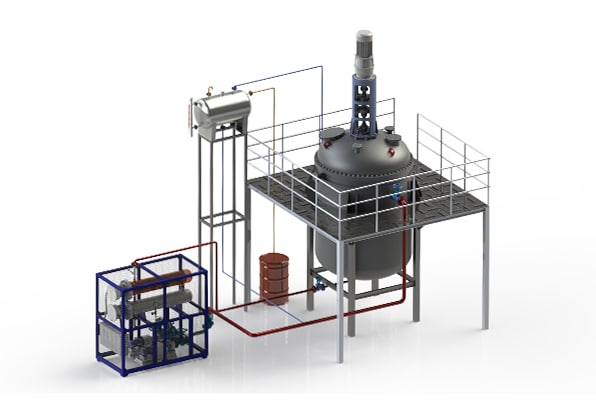In modern industrial production, efficient and safe heating solutions are crucial. They impact both process quality and production efficiency. Thermal oil electric heaters https://8ruiyan.com/en/all-organic-heat-carrier-boilers/ are internationally popular. They represent high-quality, long-life electric heating equipment. Their popularity stems from meeting these critical needs.These heaters operate on fluid thermodynamics principles. Flowing media moves under pressure through the heating chamber. It uniformly carries away the immense heat from the electric elements. This process raises the medium’s temperature to the required level.So, which fluid media are these efficient heaters suitable for? This article provides a detailed answer.

1. How Do Thermal Oil Electric Heaters Work?
These heaters are designed for flowing media. Low-temperature fluid enters the heater’s inlet under pressure. It flows through internal, scientifically designed channels.
The electric elements generate significant heat. The medium carries this heat away. The outlet temperature thus meets process requirements.
An internal control system automates power output. It uses signals from an outlet temperature sensor. This ensures a consistent output temperature.
An independent overheating protection device enhances safety. It cuts power if elements exceed safe temperatures. This prevents coking, carbonization, or element damage. It effectively extends the equipment’s service life.
2 .Suitable for Which Fluid Media?
Hydrocarbons
These heaters excel with various hydrocarbons. This includes petroleum crude oil and heavy oil. It also covers fuel oil and thermal oil itself. Lubricating oil and paraffin are also suitable. These are common in chemical and energy industries. They demand high heating safety and efficiency.
Process Water and Steam
The equipment heats process water and superheated steam. These media are essential in many industries. Examples are power generation and food processing. Pharmaceuticals also rely on them. They need precise temperature control. Stable heating performance is critical.
Molten Salts and Low-Melting-Point Metals
They also heat molten salts. Low-melting-point metals are also suitable. Examples are aluminum, zinc, tin, and Babbitt metal. Molten salts are used in solar thermal power. Chemical processes also utilize them. Heating these metals is common in metallurgy. Foundry industries frequently require it.
Gaseous Media
These heaters work with gaseous media. Examples are nitrogen, air, and water gas. Gas heating is a key step in chemical processes. Environmental control also requires it. Such applications need high explosion-proof capabilities.
Acid, Alkali, and Salt Solutions
The equipment handles various chemical media. This includes nitrate solutions. Acid-base solutions are also suitable. This enables use in diverse fields. Electroplating is one example. Chemical synthesis is another. Wastewater treatment also applies this technology.
3.What Are the Application Scenarios?
Chemical Industry
They are used for heating chemical materials. Drying powders under pressure is another use. Chemical processes and spray drying also employ them. Stable heating and precise control are vital. They meet strict chemical safety standards.
Petroleum and Natural Gas Industry
Explosion-proof models are used here. They are common in petroleum and natural gas. Offshore platforms and ships use them. Mining areas also deploy these heaters. These environments have flammable materials. They require superior explosion-proof safety.
Military and Aerospace Fields
These sectors value high reliability. Explosion-proof capability is also critical. Applications include military and aerospace. Nuclear power plants also use them. These fields demand extreme safety. Equipment stability is paramount.
Plastics and Rubber Industry
They are used for mold heating. Calender heating is another application. Extruder heating also uses this technology. Uniform heating improves product quality. It also boosts production efficiency.
4.Key Considerations for Selection of Fluid Media
Medium Characteristics
Consider the physical and chemical properties. Key factors are viscosity and heat capacity. Corrosiveness and flash point matter. Toxicity is also important. Different organic heat carriers shouldn’t mix. If mixing is essential, consult the producer. Follow their provided conditions.
Explosion-Proof Rating
Different scenarios have different needs. Hazardous environments require specific ratings. This includes chemical and petroleum sites. Always choose equipment matching the site’s requirements.
Temperature and Pressure Requirements
Select based on process needs. Consider the temperature range. Note the pressure level. These heaters can reach 405°C. This suits most industrial applications.
Equipment Material
Match the material to the medium. Corrosive media need resistant materials. This is crucial for acid and salt solutions.
Safety Protection Features
Choose a comprehensive safety system. Look for over-temperature protection. Over-pressure protection is also key. Leakage and dry-fire protection matter. These features prevent accidents. They ensure safe operation.
Conclusie
Thermal oil electric heaters handle many fluid media. They work from hydrocarbons to acid-base solutions. They heat process gases and low-melting-point metals.
Their uses span many industries. Chemical, petroleum, and military fields apply them. Plastics and rubber industries also benefit. Correct selection improves production efficiency. It also cuts energy use and operating costs.
Regular analysis of heat carriers is essential. Check carbon residue and acid value. Monitor viscosity and flash point. If two indicators are unqualified, act. Replace or regenerate the heat carrier promptly. This is also needed if decomposition exceeds 10%.
Choosing the right heater provides reliable heat. It safeguards your production process.
For further consultation, please contact our technical team for expert advice.
Whatsapp:86-19106101570
wechat:86-19106101570
email:fob@jsryan.com
